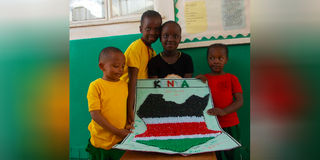What in real terms is Kenya?

Pupils display a map of Kenya made using beads.
My paternal grandmother – may she Rest in Peace – was one hell of a woman. Feisty, punchy, indomitable. Her name was Mutune. Mutune was born in a country called Kitui. You read that right – a country called Kitui in what we could today describe as Pre-Kenya. More about this later. Mutune brooked no nonsense, either from my grandfather, or any person be they male or female. She did what pleased her heart, including recreationally imbibing alcohol from time to time. She was what we would today call a feminist. Mutune was a woman, a feminist, a wife, a mother, a Mukamba, among other identities. But she wasn’t a Kenyan. Question – did she ever become a Kenyan? If so, when, and why?
We have established that Mutune was a member of the Akamba Nation in Pre-Kenya. In 1888, the Imperial British East Africa Company took the region known as Kenya and placed it under the British Empire.
This became the East African Protectorate, British East Africa, and later the Kenya Colony. On December 12, 1964 this is the international legal entity that became what is today known as the Republic of Kenya.
British subject
Did Mutune become a Kenyan in 1888 or was she simply a British subject domiciled in Kenya? Or did she become a Kenyan in 1964 when Kenya became a republic? Is there a distinction between a paper citizen – someone who’s legally a citizen of a country – and a substantive citizen?
We know that substantive citizenship is about a sense of belonging and ownership in a national project. It’s about a deep cultural consciousness and connection to the soil or ideological identity of the state and country on which one is domiciled. This presupposes that the affinity between the citizen and the legal entity is naturalised in the person. It means that one must be able to either feel, emote, or explain their own citizenship. That’s why the talk of Kenya as a business company with shareholders strikes at the heart of substantive citizenship and the shared sense of belonging. If a deep sense of citizenship isn’t there the state cannot ensure the loyalty of those who live under its roof.
This takes me back to Mutune, my grandmother. She didn’t have any formal – Western – education, or learning. Nor did that matter. She was a brilliant and wise individual. In fact, I thought of her as learned. That’s because of the complexity of her thought processes, knowledge, and wisdom that she carried in her person.
A people’s wisdom
She was steeped in her culture, which is the accumulation of a people’s wisdom. I remember one distinct conversation about religion. She told me – point blank – that she would never become either a Muslim or a Christian because she didn’t believe the two faiths could offer anything beneficial that wasn’t already part of her spiritual worldview. If that’s not wisdom, then smack me in the face.
However, it was one particular conversation I had with Mutune that has stuck to my mind and deeply influenced my scholarship as a student of the African post-colonial state. Although I was still tender in age, I had started to become a critical thinker in my early teens.
One day, I asked her if she could define a Kenyan, or Kenya, for me. I inquired of her if she believed she was a Kenyan. The question was prompted by the assassination of Tom Mboya, the iconic politician, on July 5, 1969 and the ensuing ethnic violence and tension. Everyone “knew” who had killed Mr Mboya, and why. I knew – instinctively – the answers to these questions. That’s why Interrogated Mutune.
Mutune was seated when I asked these questions. But after a long minute, she sprung to her feet and was eye-level with me. She said, “You are a clever one.”
I demurred and insisted she answers my questions. At first she denied the importance of the questions. Then in resignation, she told me all she knew was that she was a Mukamba now living in a place called Kenya. I asked her if she had anything in common with our close neighbours the Agikuyu, the Embu, Ameru, and the Tharaka. Without hesitation she told me those were “fre-enemies” – foes and friends depending on the season. She reminded me that folks from these groups were intermarried with the Akamba, even in our village.
I took from this exchange that the young republic – and the colonial state of yore – had failed to forge a national consciousness in those who live in Kenya. Decades later, I believe Kenya is full of the Mutunes of this world. Most Kenyans are paper citizens. They don’t know – and can’t define – what is Kenya or Kenyan. We have no national identity or national consciousness – that thing I called zeitgeist. Our founding mothers and fathers utterly failed in creating a Kenyan. Our elites are even worse. They don’t even try. They divide and conquer. That’s why Kenya is in deep crisis.
Makau Mutua is SUNY Distinguished Professor and Margaret W. Wong Professor at Buffalo Law School, The State University of New York. @makaumutua.





